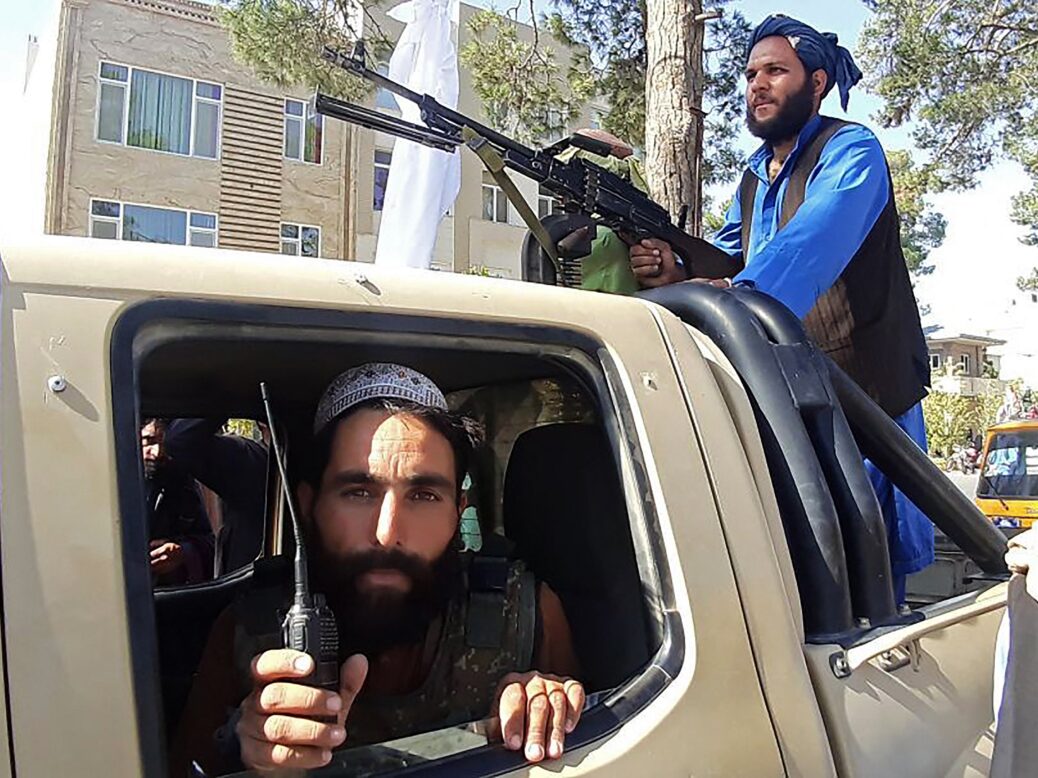
I am writing this column on Friday 13 August on a flight from Kabul to Istanbul. Herat and Kandahar, two major cities in Afghanistan, have just fallen to the Taliban and Kabul seems certain to fall as well, perhaps within a week. For many days, the critical question has been: when will Kabul fall? “Certainly in September,” one diplomat said soon after I arrived in the capital last week. By the next day, even this prediction seemed optimistic. The Afghan state is not so much collapsing before our eyes as revealing itself as a fiction.
In Kandahar, I’m told, there were supposed to be 13,000 policemen. In reality, there are only 900. The remainder? They were never hired in the first place or they left owing to lack of payment, the funds siphoned elsewhere. Corruption is widespread, and so too is dejection. The Afghan president Ashraf Ghani is almost universally reviled. One former Afghan official told me while I was in Kabul that the public “do not consider him an Afghan, they do not see him as a Muslim and they do not esteem him as a good human being”. From market traders to senior officials, the same feeling towards Ghani was expressed by everyone I met.
On the road to the airport, as I was hastily leaving the city, there was a renewed sense of panic. It happened overnight. Yesterday many still believed that the divisions between the government and the warlords would be healed once it dawned on the authorities how dire the military situation truly was. Perhaps that is why the Taliban continues to press its advantage. Were Ghani to resign, a new government of national unity could be formed and many of the local warlords that have sworn never to fight for the palace could change their minds.
It is Friday 13 August, and the capital woke up to long throngs of refugees from the north, who were setting up camps in parks and outside mosques. I almost missed my flight because the road to the airport was clogged with people who were racing to escape the country. One young woman covered in a green shawl asked me to take a photo and then repeated the request until the photo lived up to the final memories she was trying to build. “Maybe it is my last time,” she said shyly, apologising for the trouble.
[see also: What the Taliban’s victory in Afghanistan means for the rest of the world]
Two days ago, on 11 August, during a dinner in a secure house deep in Kabul’s “secure” green zone, the division was between Afghans and foreigners. The latter had an apocalyptic interpretation of events: Kabul would soon fall and there was nothing to be done about it. The Afghans, prominent politicians and businessmen, were less focused on the coming storm. All that is about to happen has taken place many times before. Remember the coup of 1973? Remember 1996, when the Taliban seized the capital?
One businessman told me nothing will be simple. Yes, the Taliban will come and it will lay siege to the city, but then the government will be forced to negotiate and some new situation will emerge. It always has. If he has to escape, he said, he will follow the same methods used by his parents and grandparents in the past. “The tested methods. I will not run away now. I will run away when the need arrives, not before.”
This is history on the scriptural plane. Lotfullah Najafizada, the director of Afghanistan’s leading TV news channel, told me a great battle is approaching, a moment of truth. “We will fall, but then the question comes, will we rise again?” It is difficult to know how seriously to take this equanimity. Life in Kabul is not like life elsewhere. While I made small talk with one ambassador, he made casual recommendations for my time in the city. “Watch out for the little begging children approaching your car. They could throw a grenade under it or attach a bomb.” Very well, but how do you watch out for them? Children are everywhere around my car, begging me to open the window. “And wear a seat belt.” Not to protect you from a crash, as cars can barely move in the Kabul traffic. “To prevent you from smashing your skull against the car roof when a bomb explodes underneath.”
Going to one of the parties or dinners in the green zone involves at least 30 minutes of security checks in what, in the night shadows, look like tunnels carved deep between concrete ramparts erected on all sides of the street. At some point I wondered if my car was about to be disassembled. I am not a target, but how about those who are? Have you tried being stuck in traffic for an hour or more, waiting for someone to throw a grenade under your seat?
The politicians and businessmen I met are adventurers by nature. There is selfishness in danger. Many dive into the Afghan war paths and step out again, carrying prizes and stories to tell their foreign friends. But there is also selflessness in danger. You lose yourself against the background of so many tragedies and heroes, whose faces adorn every corner of Kabul.
In Afghanistan no one feels capable of stopping the movement of history, with all its struggles and calamities. This is a country ruled by fate and for the last 20 years, fate, with all its randomness, has been manufactured in the United States.
Bruno Maçães was the Portuguese Europe minister from 2013-2015 and is the author of the forthcoming book “Geopolitics for the End Time: From the Pandemic to the Climate Crisis” (2021).
[see also: Our indifference to the fate of Afghanistan’s people may become a source of national shame]



